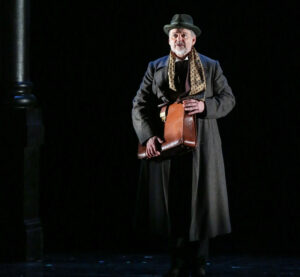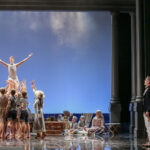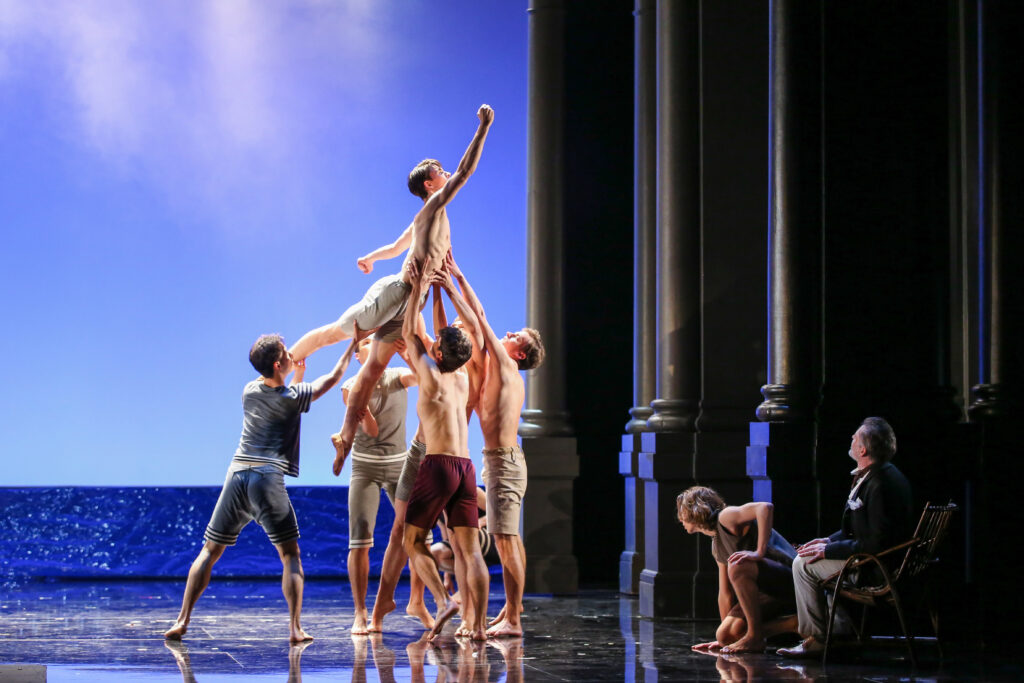 Next scene, a traveller with walking sticks, (Martin Winkler’s bass-baritone) sings of hallucinations and longing. Nothing keeps you here, he repeats to Aschenbach. Should he travel soon? He will be free, and travel to southern lands; live out his dreams.
Next scene, a traveller with walking sticks, (Martin Winkler’s bass-baritone) sings of hallucinations and longing. Nothing keeps you here, he repeats to Aschenbach. Should he travel soon? He will be free, and travel to southern lands; live out his dreams.
So the port Quayside is bathed in a rich, gold light, glowing. Lighting (Paule Constable) the antique brown leather and canvas luggage.
On walks an ‘American’ tourist, white-suited, heavily made up, with outrageous red-dyed hair, in a high-pitched tenor, Adio. We have distinguished company on board, he announces. (‘He’s old, really old’, remarks a shocked, prurient Aschenbach.) Venice, a good destination, remarks David Sitka’s elderly ‘queen’. You’ll find everything you want. (He means Knaben , boys). The Chorus (Vienna Voksoper) sing of Venice’s Serenissima. Hurra! my beauties, sings Sitka. Britten’s fascinating orchestration includes bells, trumpets, and wind instruments striedent like wild birds. Gerrit Priessnitz conducts Volksoper’s very accomplished, world-class orchestra.
Aschenbach’s gondola is sailing in a misty undercurrent. The gondola, linking diverse scenes might represent Charan’s boat transporting sinners from the underworld ; Aschenbach is on a quest to the unknown. He will take him to the Lido. Later we hear he (Winkler again) is no gondolier, but a gauner, a no-good; he was lying.
Reaching the hotel lobby, superb staging, marble floors, realistic pillars; very impressive, expensive looking sets for a small opera house. Trost’s Aschenbach, again between the scenes, in a monologue- rezitative- his thought processes laid-bare to the audience, to piano accompaniment.
The hotel dining room is where Aschenbach regularly sees the Polish family, and glimpses Tadzio (Victor Cagnin.) The hotel epitomises fin-de-siecle luxury, with sumptuous interiors.
Tadzio resembles a Greek god in Thomas Mann’s scheme, arguably, he embodies the ‘Apollonian ideal of youth and beauty: pitted against the ‘Dionysian’ principle of chaos and greed’ that prevails increasingly in Act 2. Tadzio- Victor Cagnin with Vienna State Ballet- is a silent, dance role. He’s represented by the gamelan, and ‘archaic percussion instruments’ in Britten’s depiction of the ethereal, of ‘such beauty.’
Against the gloom and shadows of the early scenes- the repressed Aschenbach- the beach scenes, brilliantly but subtly lit, are warmly realistic, as if you’re there. Trost’s Aschenbach is now slimmer-looking, in cream-coloured pants, and a black jacket. He’s centre stage, the rival buddies Cagnin’s Tadzio, and Jaschiu (Flavio Paciscopi), playing beach ball, wrestling. The boys fall on each other. At first Tadzio is lying centre-stage, then they fight, the choreography (Lynne Page) breath-taking.
(In Aschenbach’s inter-scene monologues, we learn he’s been alone since the death of his wife, and his daughter’s married off. Better out, searching his own way…)
Aschenbach takes a gondola into Venice, but is stifled by the stink of sewage, and the constant beggars and hawkers. Enough! he must go! But won’t be hassled, needs a little more time. (His luggage, sent ahead, gets lost.) Glimpsing Tadzio, he’s secretly overjoyed. Feels renewed. So it is! He will remain and devote himself to ‘the light of Apollo.’
 In the Games of Apollo, Aschenbach has given up his days for pleasure; like the ‘old queen’ who’s returned. Aschenbach sings beauty is the only form we can recognise. Aschenbach observes Sitka’s ‘queen’ supervise the ‘Olympian games’: how Sitka identifies with the erotic. The games are not in themselves homo-erotic; rather in the eye of the observer. (Turn of century, Cezanne’s and Degas’ paintings of naked boys on the beach are innocent; no way homoerotic.) Tadzio apparently winks at him, and Aschenbach realises the nature of his feelings; he admits to himself, Ich liebe dich.
In the Games of Apollo, Aschenbach has given up his days for pleasure; like the ‘old queen’ who’s returned. Aschenbach sings beauty is the only form we can recognise. Aschenbach observes Sitka’s ‘queen’ supervise the ‘Olympian games’: how Sitka identifies with the erotic. The games are not in themselves homo-erotic; rather in the eye of the observer. (Turn of century, Cezanne’s and Degas’ paintings of naked boys on the beach are innocent; no way homoerotic.) Tadzio apparently winks at him, and Aschenbach realises the nature of his feelings; he admits to himself, Ich liebe dich.
Opening Part 2, Aschenbach stares out to sea from a balcony, his monologue again to an interracting piano. He tries to understand his state of mind: ‘I love you.’ Then you realise there’s too much text, too many longeurs, in this second half. The problem may be that it overruns .Maybe the ballet sequences were too extended.
In Scene 8, the Barber’s Shop, the hotel barber lets slip rumours about an epidemic. But this is the second visit, when Aschenbach comes out resembling the elderly fop: a foil to Aschenbach, a warning of his dissipation. (Compared to Visconti’s film, Dirk Bogard’s Aschenbach said very little, his feelings expressed through facial gestures: a deep melancholy, and sadness,)
Aschenbach, alerted by the public notices about cholera- the epidemic he reads about in the German newspapers- tails the Polish family. Not so much to protect them, but to stalk Tadzio. ‘Now he won’t let him out of his sight’, pursuing the family hiding behind those Venetian pillars.
‘Deep in his enjoyment of madness, oh, Eros. Aschenbach collapses, Trost sinks to his knees, has a crying fit. Then tries to remind himself of his illustrious career. He’s becoming, like the Geck, a parodic figure in his infatuation.
In Scene 13, the Dream, Trost’s Aschenbach is lying on his bed, the object of a dispute between Apollo and Dionysus. The dark god of chaos triumphs. Dionysus’s followers have taken over Aschenbach, in an orgy in which Tadzio is in his bed, and dancing over it. Aschenbach cannot escape.
In the final (beach) scene, there’s a vision of the sea- elegiac, magical, with subliminal lighting. Trost is sitting in a deck chair, observing the scene from side of stage. The seascape is dreamlike, ineffably beautiful; a vision as if imagined, as we know the Polish family have checked out.
Tadzio is wrestling with Jaschiu, the game gets rough with the latter pushing Tadzio’s face into the sand. Tadzio walks towards the sea, then turns with a gesture inviting Aschenbach, who’s now slumped dying in his chair.
But the ballet sequence goes on too long, an indulgence, dramatically redundant. As earlier in the Act 1 scene with the strolling players, after Aschenbach asks their leader for information about ‘the sickness’.
Altogether magnificent, David McVicar’s postponed 2020 co-production (with Covent Garden) is a visual masterpiece. Volksoper must repeat this, judging from the euphoric audience reception. But surely with some cuts to the overlong ballet sequences, as it overruns to nearly three-and- half hours. PR. 14.5.2022
Photos: Rainer Trost as Gustav von Aschenbach; Victor Kagnin as Tadzio, Rainer Trost, Aschenbach
All photos (c) Barbara Palffy/ Volkoper Wien


Thank you for writing this post!